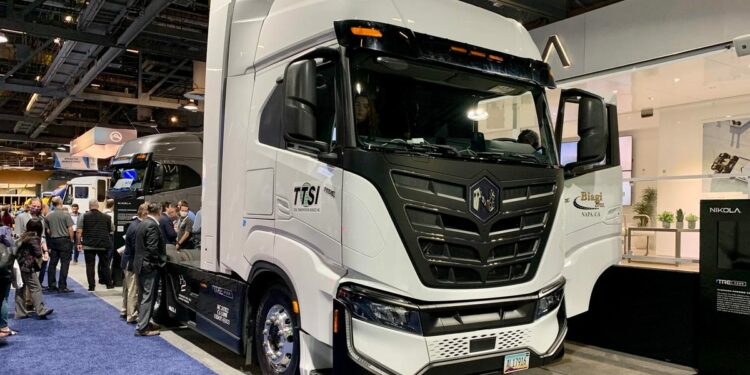The electric vehicle revolution is far bigger than Teslas and Ford’s electric pickup as the world’s top makers of heavy-duty trucks and powertrains including Navistar, Daimler, Cummins, Hyundai and Volvo also intend to shake up their industry with next-generation battery- and hydrogen-powered models that cut carbon and exhaust pollution.
A stone’s throw from the sprawling Ports of Los Angeles and Long Beach, North America’s largest cargo container terminals, truckmakers and engine and energy companies packed the Long Beach Convention Center at the Advanced Clean Transportation (ACT) Expo this week to debut, display and test out dozens of electric semi and heavy-duty commercial truck models, many of which will first go into operation at those Southern California ports. Improvements in battery and hydrogen technology, along with new federal support for clean vehicles, set the stage for wider adoption by fleet operators and surging oil prices only make them that much more compelling.
“The point of cost parity (of electric trucks), depending on the application, is much sooner than many think,” Mathias Carlbaum, president and CEO of Navistar, tells Forbes. “We see battery technology moving forward, really on the chemistry side, and all the capabilities of batteries that will be very unique and tailor-made for us moving forward.”
Though Navistar currently offers the battery-powered International eMV truck, with about 135 miles of range per charge, Carlbaum says the company is working on more advanced electric trucks with a range of over 500 miles per charge with 1 megawatt-hour battery packs that should be ready by around 2025. And though Navistar also sees a role for hydrogen fuel cell trucks, particularly for very long-range applications, it’s more optimistic than competitors, including Daimler, Volvo, Hyundai and newcomer Nikola, that battery power is the best option for most heavy-duty vehicle applications.
“The point of cost parity (of electric trucks), depending on the application, is much sooner than many think”
In part, that’s because the Volkswagen Group affiliate will leverage technology improvements flowing from VW’s plan to spend $100 billion on battery and electric propulsion R&D. As a result, “we believe 50% of our sales will be electric by 2030,” said Carlbaum. “That’s 50% by 2030 and by 2040 100%.”
Along with Navistar, top global truck manufacturers and brands, including Daimler Truck, Volvo, Hyundai and Hino, Peterbilt, Kenworth, International and Mack, China’s BYD, engine giant Cummins, and electric truck startups including Proterra, Nikola, Hyzon, Hyliion and Xos are scrambling to get zero-emission commercial vehicles into operation with trucking and logistics customers, as well as city fleets. While the purchase price for battery and hydrogen vehicles exceeds that of diesel, gasoline and natural-gas fueled trucks, potentially by tens of thousands of dollars, the companies all say the total cost of ownership, including fuel and maintenance expenses, gives them an advantage. Bake in generous incentives, such as rebates of up to $120,000 per truck that California provides, and the switch to electric vehicles looks even more compelling.
Tesla was a notable absence from the advanced truck show. Elon Musk said his electric-car company would shake up the trucking industry when he unveiled the Tesla Semi in 2017, promising a heavy hauler that would go 500 miles per charge and hit the market by late 2019. The company missed that target and hasn’t announced an official new date for the Semi’s release. Musk said last month during Tesla’s results call that it might go into production by 2023 at the new Giga Texas plant in Austin.
His competitors aren’t waiting. Freightliner, Kenworth, Peterbilt, Volvo, BYD and Lion Electric already sell battery-powered semis to U.S. customers, and more models are coming. This week Freightliner, a Daimler brand, unveiled a new version of its electric Cascadia truck that goes 230 miles per charge, and last month Nikola began delivering its Tre BEV truck that gets up to 350 miles per charge.
“In every sector, fleets are increasingly turning to a spectrum of advanced clean vehicle technologies and low-carbon fuels to not only meet their sustainability goals but improve their fleet’s bottom line,” Erik Neandross, CEO of GNA, the ACT Expo’s organizer GNA, said in opening remarks at the start of the week-long event.
GNA’s survey of market trends released this week found that heavy-duty electric truck deployments in the U.S. “will go from dozens to hundreds across this year and next with some sectors already seeing early scale. Fleet demand for BEVs is enormous and continues to exceed availability, while vehicle and battery costs remain stubbornly high, and the supply chain is still in development.”
Cummins, the largest supplier of diesel engines for heavy-duty vehicles, said this week it’s partnering with Daimler on hydrogen fuel cell systems, an electric propulsion system that several competing companies also see as the best long-term option for big trucks. Freightliner’s Cascadia semis would be modified to use Cummins’s powertrain and could get to customers by 2024. Hyundai also said this week it will be testing XCIENT fuel cell trucks at the Port of Oakland. Toyota and Kenworth already operate a test fleet of hydrogen fuel cell trucks at the Port of L.A.
“Hydrogen fuel cells are a promising solution for the demanding requirements of heavy-duty trucking,” Amy Davis, president of Cummins’s New Power unit, said in a statement. The partnership with Daimler “is an important milestone for both companies as we work to accelerate the shift to a carbon-free economy.”
Musk, a long-time hydrogen critic, reiterated his opposition to the fuel in remarks to the Financial Times this week, describing it as “the most dumb thing I could possibly imagine for energy storage.”
Still, growing interest in hydrogen trucks by companies including Hyundai, Daimler, Volvo, Toyota, Hino, General Motors, Cummins, Bosch, Nikola and Hyzon, suggest Musk’s views aren’t universally shared.
“Depending on the customer application and energy infrastructure considerations, hydrogen-powered vehicles can absolutely complement battery-powered electric vehicles in accelerating our carbon-neutral journey,” Rakesh Aneja, vice president and chief of eMobility for Daimler Trucks North America, said in announcing the Cummins collaboration.











